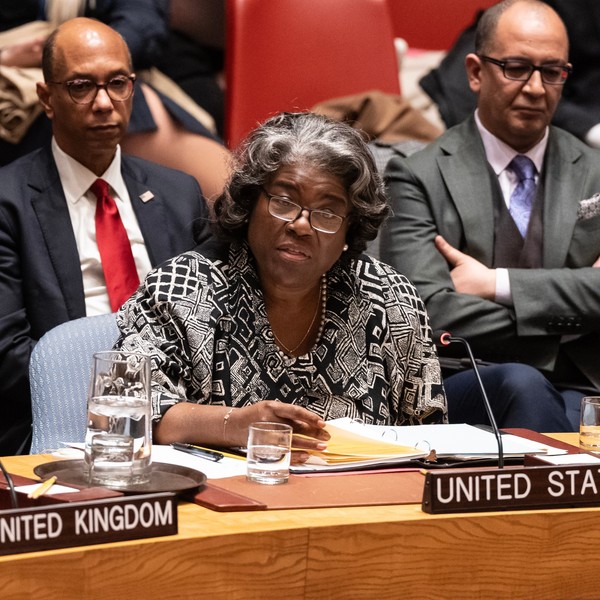The economic sanctions imposed on Iraq by the United Nations Security Council, from 1990 to 2003, may well lay claim to be the worst humanitarian catastrophe ever imposed in the name of global governance. The unconscionable human damage done by those sanctions is routinely dismissed as the unintended consequence of a well-intentioned policy from the past, which has since given way to more nuanced and humane measures. But in fact, the Iraq sanctions program is the template for the systemic, devastating sanctions we see in place today applied in a subtler and more circuitous form — although Donald Trump's "maximum pressure" campaign against Iran is neither subtle nor circuitous.
In August of 1990, Iraq invaded Kuwait. With the Soviet Union collapsing, the U.N. Security Council was no longer paralyzed by the mutual veto power of its permanent members — the United States, USSR, Great Britain, France and China — and entered a period of “activism,” where measures of unprecedented scope and severity were suddenly possible. The sanctions imposed on Iraq in U.N. Resolution 661 on August 6, 1990 were the first of these measures, prohibiting all imports and all exports with Iraq, with only the narrowest exemptions for medicine.
The sanctions alone would not necessarily have been catastrophic for Iraq. The government immediately implemented a rationing system, which was critical in staving off famine, as well as measures to increase agricultural production.
But then the bombing campaign of the Persian Gulf War of January 1991 destroyed much of Iraq’s infrastructure. An envoy from the U.N. Secretary-General described Iraq’s condition as “near-apocalyptic,” noting that Iraq had been reduced to a “pre-industrial age.”
For the next 12 years, the sanctions crippled the efforts of Iraq, as well as U.N. agencies such as the United Nations Children’s Fund (UNICEF), Food and Agriculture Organization (FAO) and the World Health Organization (WHO), to restore electricity, transportation, health care, and food security.
The pattern that emerged throughout the sanctions period was that the United States and Great Britain, sometimes accompanied by other allies, consistently sought to maximize the damage done in Iraq, with the goal of destabilizing President Saddam Hussein’s regime. The United States and its allies would sometimes agree to humanitarian provisions, but would then vitiate them in some way. This practice continued throughout the presidencies of George H.W. Bush administration, Bill Clinton, and George W. Bush.
When Security Council Resolution 661 called for food shipments under “humanitarian circumstances,” the U.S. and its allies nonetheless successfully blocked all food shipments to Iraq for eight months, until the country had been reduced to rubble in the massive bombing campaign of the first Persian Gulf War. Only then was food allowed into the country.
But of course, what was needed to sustain the lives of the Iraqi people was much more than that: agricultural inputs, goods to repair or rebuild the roads, bridges, electrical generators, and water treatment plants that had been bombed. As U.N. agencies and international human rights organizations documented the severe hardship, the massive malnutrition, and the epidemics of cholera and typhoid, pressure grew to allow Iraq to import the equipment and goods needed to restore the basic functions of the economy and infrastructure.
There was optimism that the Oil for Food Program, initiated in 1995, would resolve the humanitarian crisis. Instead, the U.S. and the U.K. blocked billions of dollars of critical goods. Medicines were allowed in, but not the refrigerators or trucks needed for the cold chain, without which the medicines would be unusable.
A water treatment plant was allowed — something of great urgency, given the epidemics of water-borne diseases — but not the generator needed to run the plant, with the rationale that it was “dual use.” Citing dual use concerns, fertilizer and pesticides were often blocked or delayed until the planting season was over, rendering them useless. Animal vaccines necessary for raising sheep and goats were blocked or delayed for months or years. Some $5.5 billion in these goods were still on hold up through the summer of 2002, when the process was taken over by professional UN staff, who quickly removed the majority of the holds to allow delivery.
From the beginning, it was clear that the humanitarian cost was unconscionable; and there was continual condemnation from human rights organizations, and considerable opposition from within the United Nations. At each point where there were calls to reduce the humanitarian damage while the United States and Great Britain went to great lengths to block reforms.
The invasion of Iraq in 2003, driven by baseless claims that Iraq had developed weapons of mass destruction, is well known. But little has been written on the enduring impact of the sanctions. These would certainly include the effects of the ongoing, widespread malnutrition that took place throughout the sanctions regime. In 2000, a UNICEF official informed the 661 Committee that 25 percent of children in south and central governorates suffered from chronic malnutrition, which was often irreversible, and 9 percent from acute malnutrition. Food insecurity and widespread malnutrition continued throughout the 13 years of sanctions. The effects of ongoing malnutrition, particularly among children, are well known and include long-term health problems and cognitive deficits.
But the Iraq sanctions have left another legacy as well: a template for doing terrible and indiscriminate harm, by economic means, with little accountability. The United States imposes sanctions on more countries than all other nations or international institutions combined. Even when the United States acts unilaterally — for example the current sanctions Trump reimposed on Iran — the sanctions may effectively exclude a target country from much of the international banking system.
When the United States blacklists government officials, national shipping lines or a national oil company, the impact can go well beyond the “bad actor” who is the ostensible target. When the United States undermines a country’s access to fuel, to major banks and insurers, and to shipping companies, or in other ways compromises a country’s imports and exports generally, the damage to the economy can be tremendous. U.S. sanctions routinely involve all of these practices.
The standard narrative about the Iraq sanctions is that they were well-intentioned, with unfortunate and unforeseeable consequences for infants and children, women, the elderly, the poor; and in any case, that was all in the past, and no one does that sort of thing anymore.
But the experience of the sanctions on Iraq is not at all in the past. We see the enduring effects of the sanctions on Iraqis today. Moreover, we see the same cruel, devastating logic of the Iraq case in contemporary sanctions regimes. Without a credible structure of accountability, to ensure that U.S. measures abide by international law, particularly international humanitarian law, the tragedies will continue to take place.















